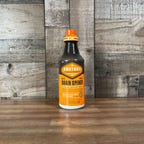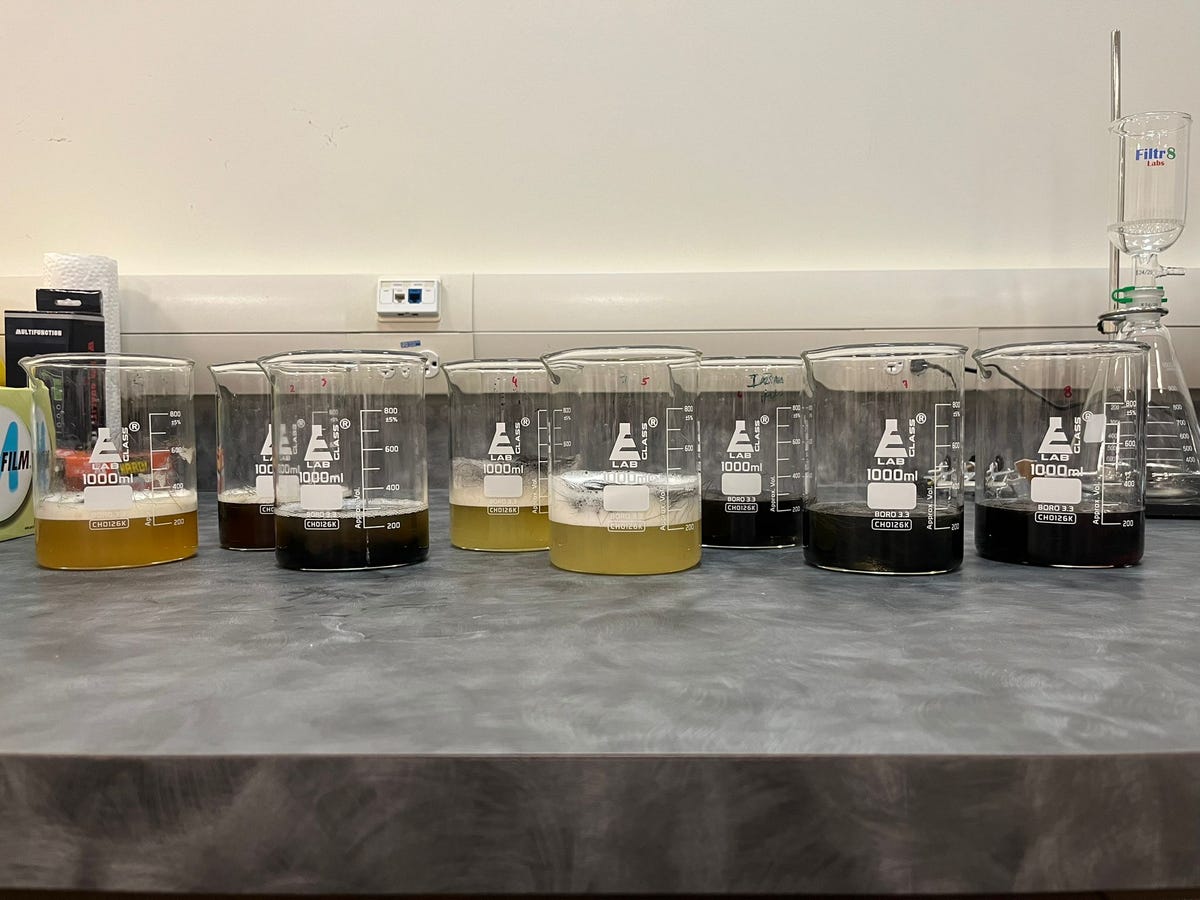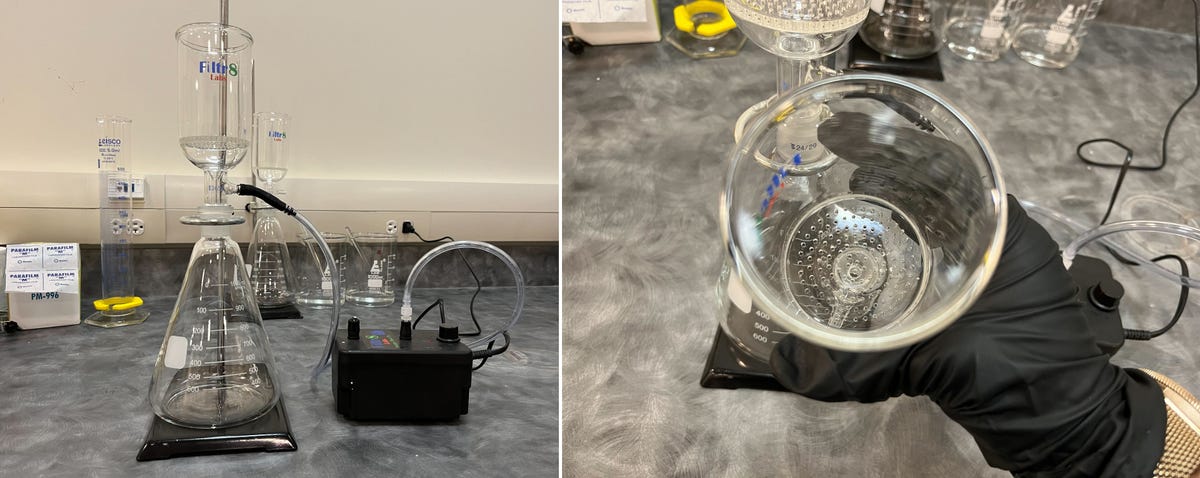
Santeen Sulfuric Acid Drain Opener
Best acidic drain cleaner
In the realm of home maintenance, clogged drains are an all-too-familiar nuisance. From organic matter and grease to hair and even paper products, the accumulation of debris within our plumbing systems can disrupt the flow of water and consequently, our daily lives. While the use of chemical drain cleaners has long been a go-to solution for tackling these stubborn blockages, their low efficiency and hazardous nature have raised concern among homeowners, plumbers, and experts alike.
In an effort to shed light on the effectiveness of these controversial products, I leaned on my background as a chemical engineer and embarked on a simple yet revealing experiment. I took eight of the most commonly available chemical drain cleaners — six alkaline and two acidic — and subjected them to dissolution tests designed to evaluate how well they’re each able to dissolve the aforementioned offending blockages. The objective was simple: to determine which products, if any, emerged as true champs in disintegrating some of the most common clogging materials.
A couple of disclaimers before we dive into our methodology and results. First, it’s essential to acknowledge the prevailing stance among most reputable plumbers, who strongly advise against the use of chemical drain cleaners. Their concerns revolve around potential damage to our plumbing systems and the buildup of harmful fumes. These professionals emphasize the importance of preventive measures, regular maintenance, and nonchemical alternatives as the optimal means of tackling clogged drains.
If you have been dealing with regular drain blockages, I encourage you to contact a plumber and ask for advice. Most of the time, blockages should be removed by mechanical means (such as a plumbing snake operated by a trained professional) and a thorough inspection is needed to determine the root cause for a long-term solution. If you have already used any type of chemical drain cleaner, you definitely have to let your plumbing professional know in advance. Withholding this information can put someone’s health and safety at risk, including yours.
All of that aside, and recognizing the ample availability and persistent usage of chemical drain cleaners, I undertook this evaluation to offer insight and guidance to those of you who may still consider them as an emergency exit. My goal is to equip you with the knowledge needed to make an informed choice. Now, without further ado, let’s play with some laboratory glassware and reveal the results.
How we test chemical drain cleaners
For this rundown, I headed to CNET’s product-testing lab in Louisville, Kentucky to conduct a comprehensive batch distillation experiment with eight of the most commonly used chemical drain cleaners on the market. My primary objective was to determine the efficiency of each product in dissolving various types of clogging materials, including organic matter, grease, paper products, and pet hair (the same pet hair we use for our robot vacuum tests, as a matter of fact). Throughout the experiment, I also noted the pH levels of the cleaning solutions when mixed with water and monitored any changes in temperature. Furthermore, I considered the chemical composition and versatility of use of each product when comparing them to one another.
Acids vs. bases
Before conducting experiments with these substances, I separated them into acids and bases. As you may recall from high school chemistry, acids are compounds that donate a hydrogen ion (H+) when mixed with water and have a pH lower than 7. On the other hand, bases are compounds that accept those ions (or hydroxide, OH- ions) and have a pH higher than 7. Understanding this distinction is crucial, due to two important factors associated with these products: corrosivity and causticity.
Corrosivity refers to the potential of a chemical substance to cause rust and deterioration of the materials that make up your piping system. Causticity, on the other hand, relates to how a chemical substance reacts when it comes into contact with organic matter, specifically breaking down proteins and other organic molecules, which can lead to tissue destruction or chemical burns.
To determine the acidity or basicity of each compound, we measure their pH. In simple terms, the more acidic or basic a compound is, the greater its potential for corrosivity and causticity.
Sample pH reading from one of our test subjects. 11.38 pH corresponds to an alkaline solution.
Acidic drain cleaners, particularly those with high acid concentrations like sulfuric acid drain cleaners, are more hazardous compared to their basic or alkaline counterparts. In chemistry, order of addition does matter. Normally, you would gradually introduce an acid to water, slowly increasing the concentration of the acid. Never add water to an acid as this reaction is known to generate a significant amount of heat and release hazardous fumes. See for yourself in the GIF below (and don’t try this at home).


Other chemical drain cleaners we’ve tested
Liquid Plumr Industrial Gel: A great option for effectively dissolving hair and organic matter, this drain cleaner is reasonably priced and claims to be safe to use with most types of pipes. Features a mixture of bleach, caustic soda, and other powerful solvents. The only reason it didn’t secure the top spot on our list is its ineffectiveness at dissolving paper products and its highly alkaline nature, 11.01 pH.
Eco Punch Drain Clog Dissolver: With the lowest dissolution performance among the products tested, this drain cleaner is primarily composed of caustic soda, bleach, and a surfactant. Surprisingly, it achieved a 40% dissolution rate for hair, 72% for organic matter, and only 1% for both grease and paper products. Additionally, it is on the pricier side when considering its cost per gallon. Highest alkalinity of the bunch, 11.33 pH when mixed with water.
Drano Max Gel: Moderate performance in dissolving hair and organic matter, achieving a dissolution rate of 60% and 59%, respectively. However, it showed limited effectiveness in dissolving grease and paper, with rates of only 12% and 2%. This drain cleaner is competitively priced, ranking as the third-most affordable option when comparing price per gallon.
Instant Power Main Line Opener: This concentrated lye drain cleaner offers excellent performance in dissolving hair and organic matter. Unfortunately, it had almost negligible effect on grease and paper, scoring 1% and 0% respectively. It has the second lowest price per gallon. However, it’s important to note that this product is designed to be used in one go, pouring the entirety of the bottle. Given its alkaline behavior (10.1 pH), corrosion is definitely a concern.
Zep Sulfuric Acid Drain Opener: Surprisingly low performance dissolving hair, given it’s a sulfuric acid drain cleaner. Highest performance dissolving paper products; it was the only one to score 100% in this category. However, it almost doubles the rest of its competition in price per gallon. Use with extreme caution and follow all instructions.
Chemical drain cleaners FAQ
What are chemical drain cleaners?
Are chemical drain cleaners safe to use?
Can chemical drain cleaners damage my pipes?
How long should I leave the chemical drain cleaner in the drain?
Are there any alternatives to chemical drain cleaners?

